FRAMECAD: Innovating for Faster Construction and Better Built Environments
The modular sector is leading the way in an industry that has seen little change in the past 100 years. To paraphrase the good people at modular.org, building in a controlled environment delivers multiple benefits, improved quality, sustainability, efficiency, cost-effectiveness, and shorter time to completion.
Innovation in process and thinking has created a flexible, modern construction methodology at the forefront of rejuvenating global construction. Well, yes, that is why we’re here, you say. So tell us something we don’t already know.
But what if we could take the benefits that modular building, prefabrication, and offsite construction deliver and amplify them even more? At the risk of coming across all click-baity, you can.
Construction automation technology company, FRAMECAD®, has spent the past 30 years developing, innovating, and refining its cold-formed steel (CFS) construction system. An integrated end-to-end engineering design-and-build system with the technical tools to accelerate the construction process, increase productivity & accuracy, and reduce labor costs.
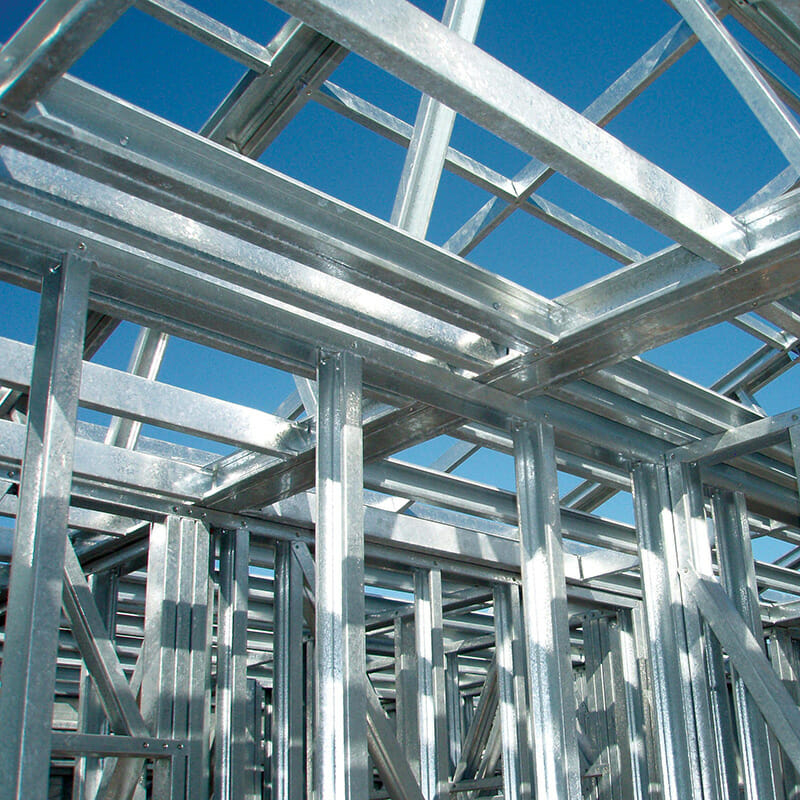
Innovating for faster construction and better built environments
FRAMECAD’s General Manager Global Marketing, Michelle Haynes, says, “At FRAMECAD®, innovation is everything. It’s a catalyst for growth – whether it’s enabling clients to construct buildings quickly and safely through an integrated system or supporting communities to achieve a better standard of living - we’ve spent 30 years researching and testing a platform that people can rely on. We have a constant focus on continuous improvement and innovation – in our software, our manufacturing equipment, our services, and our support.”
FRAMECAD’s innovation philosophy is simple; to explore and implement continuous improvements that improve every step of the building process. Both significant and incremental innovations can have a direct impact on the efficiency and ROI of building projects.
The company’s design-and-build system is built on a design-led approach to construction, using software and manufacturing technology to produce highly accurate building components. This approach reduces the input required from engineers and the need for skilled construction labor, which significantly reduces onsite errors and material wastage.
The FRAMECAD® system incorporates sophisticated, integrated software platforms that automate the design, engineering, manufacturing, and construction processes, combined with technologically advanced roll forming equipment.
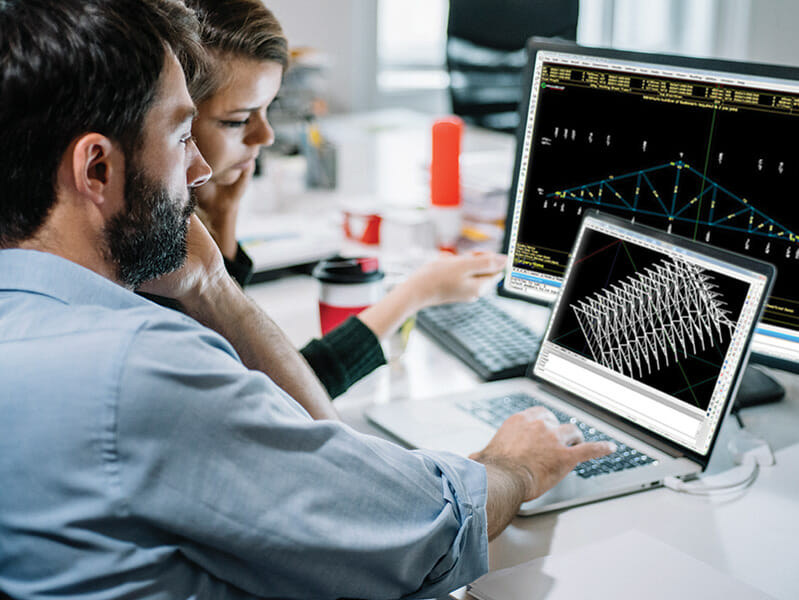
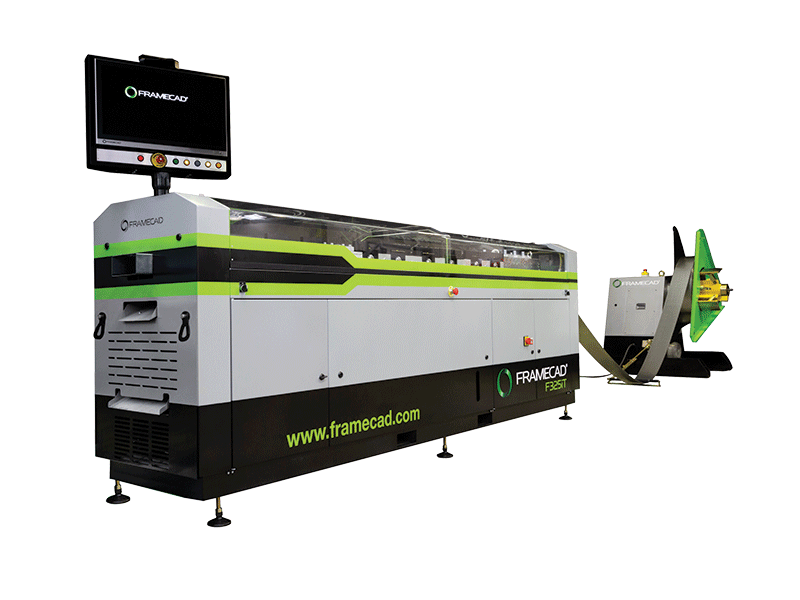
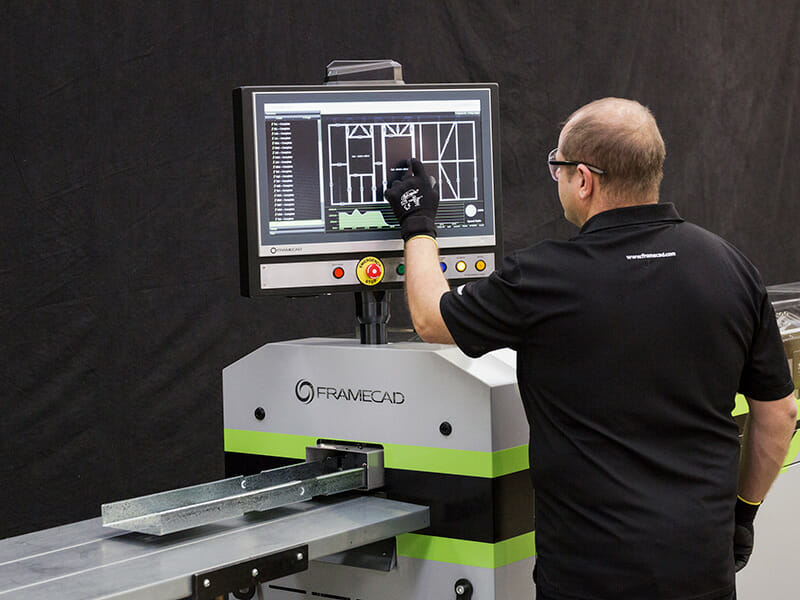
Further increases in efficiency for modular processes
With offsite or modular construction, the downstream efficiencies are evident: pre-assembling in controlled conditions speeds up installation onsite and drastically reduces rework. The process and technology innovations in the FRAMECAD system provide further improvements at these later stages while contributing additional benefits across the end-to-end process.
Design & Engineering: Increased flexibility and speed
Design-led construction removes additional time earlier in the project timeline. FRAMECAD’s advanced integrated software helps speed up the design and engineering processes. The fully compliant software has building codes built-in, ensuring all designs and engineering meets local codes and regulations. Compliance removes lengthy delays in approvals and redesign processes. Focusing on the complete design upfront, you ensure all service requirements are included at the design stage, allowing for production planning and any subassemblies requirements.
According to McKinsey, the construction industry is moving towards a manufacturing-like system of mass production, relying on smart technologies, such as the Internet of Things (IoT), big data analytics, and cloud computing to conduct end-to-end design and build automation. The use of these techniques could boost the industry’s productivity by five to tenfold.
BIM (Building Information Modelling)-enabled, fully-integrated construction is set to drive the complete process from design to manufacture, fabrication, and installation. Therefore, the construction process must be seamlessly integrated to take full advantage of the benefits BIM offers, ensuring the final building model is reflective of all changes.
The FRAMECAD software suite offers streamlined building information modeling integration with its latest software developments.
Ms. Haynes confirms all FRAMECAD® software releases include planned upgrades from a comprehensive product development road map. In addition, direct customer feedback and requirements further refine and update this plan.
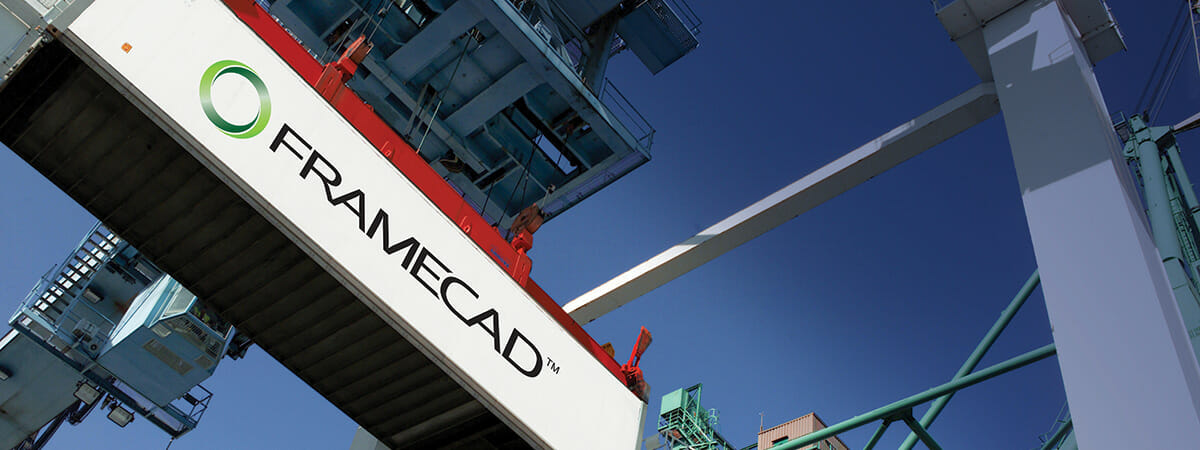
Manufacturing & Production: Precision, accuracy & control
FRAMECAD’s integrated machine control software speeds up the manufacturing process. The control software utilizes high contrast, touch-operational screens operated from the production floor, allowing complete control of the manufacturing process.
Technologically advanced roll-forming equipment produces millimeter-precise frames precisely as designed. FRAMECAD® manufacturing systems utilize a specialized servo-drive motor combined with a world-leading encoder system, creating punches, cuts, and chamfers with less than 0.01mm tolerance for perfectly accurate frames assembled quickly and efficiently, removing the need for costly rework.
Each manufacturing system is designed and built for the individual customer’s requirements, often driving new improvements that work their way across the product line. For example, a recent customer request required additional non-standard tooling, which led to the comprehensive F325iT-L manufacturing system. As with its software, FRAMECAD has a complete product development program that runs alongside any customer-driven enhancements.
Construction: Rapid construction, the smart way
In line with modular construction principles, FRAMECAD’s system enables simple construction onsite, reducing the need for skilled labor, simplifying logistics, and virtually eliminating material wastage on site.
For situations where site conditions make access challenging or in remote locations, FRAMECAD® has reimagined traditional production, developing a mobile factory solution. The FRAMECAD Mobile Factory is a completely secure, self-contained steel frame roll-forming production facility able to be located anywhere needed, especially in remote areas with little or no infrastructure. It offers a perfect solution for disaster-relief and humanitarian situations. Organizations like the US Navy use this innovative solution to provide more effective and efficient disaster relief and humanitarian assistance.
Business Systems & Support services: Better visibility for real-time decision making
WiFi-enabled, the innovative technology of FRAMECAD Factory 2 control software enables real-time data to be uploaded to My Production, a tool within the exclusive MyFRAMECAD customer portal. As a result, FRAMECAD customers can turn this production data into powerful business insights, gain better control of output and results, and optimize production from anywhere in the world.
MyFRAMECAD is constantly updated to deliver a better customer experience. The platform currently includes an online shop for software licenses renewal and purchasing
of parts and other services. It also houses Knowledge Center, a unique information library full of thousands of resources to help FRAMECAD customers optimize their FRAMECAD software and roll forming equipment and build better using cold-formed steel.
Plans are underway for several technology developments for the MyFRAMECAD platform through late 2021 and into 2022.
Innovation thinking is driving the global growth of modular construction. Modular and offsite methodologies are creating positive waves across the construction industry, forcing a rethinking of processes and outputs, challenging conventions, and pushing the boundaries of traditional thinking. FRAMECAD’s constant focus on innovation mirrors this growth. By looking at each step in the process and delivering additional value, the potential improvements are exponential.
Mark Taylor, FRAMECAD’s Founder and CEO, sums up the company’s innovation ethos: “The speed of change in the world demands a new approach to construction… At FRAMECAD®, we look towards modern approaches to construction, and for more than 30 years, we have been so excited about innovation in Cold-Formed Steel construction to meet these needs.”
More from Modular Advantage
AoRa Development Aims for New York’s First Triple Net Zero Building Using Modular Methods
More cities are providing funding for newer infrastructure projects as long as they meet sustainability requirements. This is how modular can fit the bill, thanks to its lower waste production.
Developers and Designers: Lessons Learned with Modular Design
Modular construction is attractive to many developers because sitework and module construction can occur simultaneously, shortening the schedule and reducing additional costs.
UTILE: Putting Modular Building on a Fast Track
In Quebec, UTILE is taking the lead in creating affordable modular buildings to help decrease the student housing shortage. During the process, the company discovered what it takes to make the transition to modular building a success.
Sobha Modular Teaches Developers How to Think Like Manufacturers
With its 2.7 million square foot factory in UAE, Sobha Modular is bringing both its high-end bathroom pods to high-end residences to Dubai while developing modular projects for the U.S. and Australia.
RoadMasters: Why Early Transport Planning is Make-or-Break in Modular Construction
In modular construction, transportation is often called the “missing link.” While it rarely stops a project outright, poor planning can trigger costly delays, rerouting, and budget overruns.
Navigating Risk in Commercial Real Estate and Modular Construction: Insights from a 44-Year Industry Veteran
Modular projects involve manufacturing, transportation, and on-site assembly. Developers must understand exactly what they are responsible for versus what they subcontract. Risk advisors should research the developer’s contractors, subcontractors, and design-build consultants—especially the modular manufacturer.
Art²Park – A Creative Application of Modular and Conventional Construction
Art²Park is more than a park building—it’s a demonstration of what modular construction can achieve when thoughtfully integrated with traditional materials. The use of shipping containers provided not only speed and sustainability benefits but also a powerful structural core that simplified and strengthened the rest of the building.
Building Smarter: A New Standard in Modular Construction Efficiency
Rising material prices, labour shortages, expensive financing and tightening environmental rules have made conventional construction slower, costlier, and more unpredictable. To keep projects on schedule and within budget, builders are increasingly turning to smarter industrialized methods.
Resia: Breaking All the Rules
Resia Manufacturing, a division of U.S.-based Resia, is now offering prefabricated bathroom and kitchen components to industry partners. Its hybrid fabrication facility produces more precise bathroom and kitchen components (modules) faster and at lower cost than traditional construction. Here’s how Resia Manufacturing does it.
How LINQ Modular Innovates to Bring Modular To The Market in the UAE and Beyond
LINQ Modular, with an office and three manufacturing facilities in Dubai, is a modular firm based in United Arab Emirates. The company is on a mission: to break open the housing and construction markets in the Gulf Cooperation Council (GCC) area with modular.










